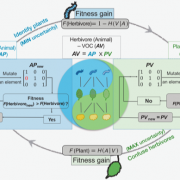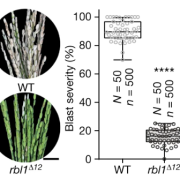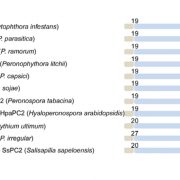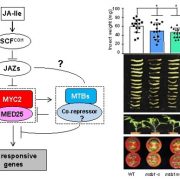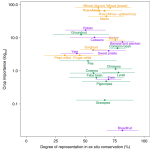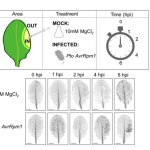Spermine inhibits PAMP ROS and Ca2+ burst and reshapes the transcriptional landscape of PAMP-triggered immunity in Arabidopsis (bioRxiv)
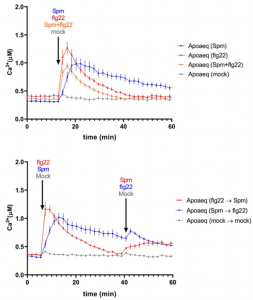 Polyamines are endogenous cationic amines that have been shown to regulate a plethora of biological processes in plants, including the hypersensitive response. However, the importance of polyamines in other aspects of plant immunity has not yet been fully explored. In this new preprint, Zhang and colleagues examine the role of two polyamines, spermine and putrescine, in various aspects of defence in Arabidopsis thaliana. First, the group showed that treatment with exogenous spermine induced a small but sustained ROS wave, but inhibited the characteristic ROS burst associated with exposure to the bacterial peptide flagellin. This effect was independent of salicylic acid signalling pathways but was dependent on the NADPH oxidase RBOHD. The researchers took a pharmacological approach to dissect this mechanism, concluding that spermine inhibits ROS production via direct inhibition of RBOHD or its ROS scavenging ability, rather than via its interactions with the flagellin receptor. Interestingly spermine treatment also induced cytosolic calcium influx, but reduced the calcium increase induced by flagellin, suggesting that spermine may block RBOHD activation via its upstream effects on calcium signalling. Finally, the group conducted gene expression analysis on plants treated with combinations of the two polyamines and flagellin, showing that both polyamines can alter defence associated transcriptional programs. (Summary by Rory Burke @rorby95) bioRxiv 10.1101/2022.05.05.490826
Polyamines are endogenous cationic amines that have been shown to regulate a plethora of biological processes in plants, including the hypersensitive response. However, the importance of polyamines in other aspects of plant immunity has not yet been fully explored. In this new preprint, Zhang and colleagues examine the role of two polyamines, spermine and putrescine, in various aspects of defence in Arabidopsis thaliana. First, the group showed that treatment with exogenous spermine induced a small but sustained ROS wave, but inhibited the characteristic ROS burst associated with exposure to the bacterial peptide flagellin. This effect was independent of salicylic acid signalling pathways but was dependent on the NADPH oxidase RBOHD. The researchers took a pharmacological approach to dissect this mechanism, concluding that spermine inhibits ROS production via direct inhibition of RBOHD or its ROS scavenging ability, rather than via its interactions with the flagellin receptor. Interestingly spermine treatment also induced cytosolic calcium influx, but reduced the calcium increase induced by flagellin, suggesting that spermine may block RBOHD activation via its upstream effects on calcium signalling. Finally, the group conducted gene expression analysis on plants treated with combinations of the two polyamines and flagellin, showing that both polyamines can alter defence associated transcriptional programs. (Summary by Rory Burke @rorby95) bioRxiv 10.1101/2022.05.05.490826



